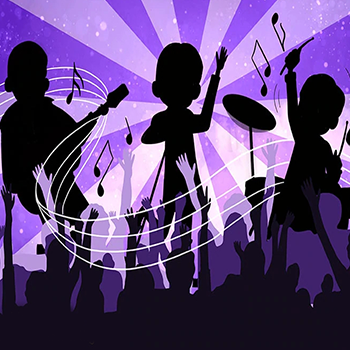Shopping Cart (0)
Your cart is currently empty.
TRIPLET30: 30% off on purchase of 3 books
Your cart is currently empty.

In 2018, a research team consisting of anthropologists, psychologists, biologists, musicians and linguists from top universities around the world concluded that “music is the universal language of mankind”. Be it hymns echoing through the rafters of ancient European cathedrals to the vibrating ding of Buddhist singing bowls, music is a means used to transcend or connect people across cultures.
Humans can identify music related to behaviors such as lullabies, healing, dance, love and ritual, no matter how foreign or remote.
What Role Does Music Play In A Child’s Life?

Like language, music is a shared and expressive way to be together. It can be a powerful force in the lives of children and families. On a side note, do you remember the old classic Bollywood movies that had a family song? Invariably, the family separated and reunited decades later only when they heard each other sing the family song.
“There’s some good neuroscience research that children involved in music have larger growth of neural activity than people not in music training. When you’re a musician and you’re playing an instrument, you have to be using more of your brain,” says Dr. Eric Rasmussen, chair of the Early Childhood Music Department at the Peabody Preparatory of The Johns Hopkins University.
The basis of good music has always been part of Disney's films starting from “Someday my prince will come”( Snow White and the Seven Dwarf’s) to today's “We don’t talk about Bruno” (Encanto) It includes a rich collection of music whether it’s “Let It Go” (Frozen) or “Un Poco Loco”(Coco) or “Hakuna Matata” (The Lion King) or “Arabian Nights”(Aladdin) or “How far I’ll go” (Moana). The list is endless and just a small paragraph doesn’t do justice to the legacy of Disney films.
From learning the sound of each note of the scale from the hit song “Do Re Mi” (Sound of Music) to trying to sing Supercalifragilisticexpialidocious (Mary Poppins), my life was nothing short of musical while growing up. What is noteworthy is the fact that the movie, Mary Poppins, contained live action, animation and music.

Galli Galli Sim Sim, the Hindi language adaptation of the hit American children’s series Sesame Street was a favorite too. As a mom, I made sure to introduce the same to my little girl. The life lessons that music teaches you, even money can’t buy!
What Are The Benefits Of Learning Music?
The debate on the monetary benefits of music as a career has always raged with everyone being divided on the conclusion. The important point to remember is that music builds skills that make a difference in both your professional and personal life. Listed below are a few benefits:
In music, students are required to recognize and repeat pitch, tone, or enunciation of words resulting in enhanced reading comprehension skills.
The causal link between music and spatial intelligence means that music helps children visualize various elements that should go together and helps in mapping.
A great story that I came across recently is “The Music Band” which is about three childhood friends who are trying to form a music band and face a few minor hurdles along the way. They are pleasantly surprised when they learn that one of their friend’s mom was a singer in a band earlier.
National Association of Music Merchants Foundation (NAMM Foundation) says, learning to play a musical instrument can improve mathematical learning.
Who Are Child Music Prodigies?
A child prodigy is defined as a person under the age of ten who produces significant output in a domain to the level of an adult expert performer. Similarly, child music prodigies are the ones who displayed a skill level otherwise displayed by skilled adult musicians. Let us take a look at four music prodigies who have proven their expertise in their musical fields at a young age.




The assumption that children are not emotionally mature to grasp the nuances of intricate music negates the fact that humans are tuned or inclined to music by birth. Leonard Bernstein, in his 1973 Norton Lectures at Harvard University echoed Moan Chomsky’s theory of “universal grammar” - music as a natural language in which melody functions as a noun, harmony as an adjective, and musical metre as a verb.
Simply put, music brings us joy. Imagine listening to an upbeat song in the car with air in your hair. That is sheer joy!
Let us know your thoughts! If you like the article or have a question or a suggestion, do leave a comment below. View our complete catalog of books here.
You have no items in wishlist.
We will send you an email to reset your password.
| Title |
|---|
| Price |
| Add to cart |
| Type |
| Vendor |

comments (19)
Hello, the whole thing is going nicely hete and ofcourse every
one is sharing facts, that’s actually excellent,
keep up writing. https://Www.Waste-Ndc.pro/community/profile/tressa79906983/
Hello, the whole thing iss going nicely here and ofcourse every one is
sharing facts, that’s actually excellent, keep uup writing. https://Www.Waste-Ndc.pro/community/profile/tressa79906983/
From shoulders down with! Good riddance! The better!
Yes, really. It was and with me. We can communicate on this theme.
https://virtual-local-numbers.com/countries/32-usa.html